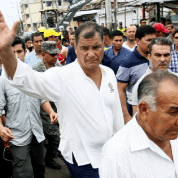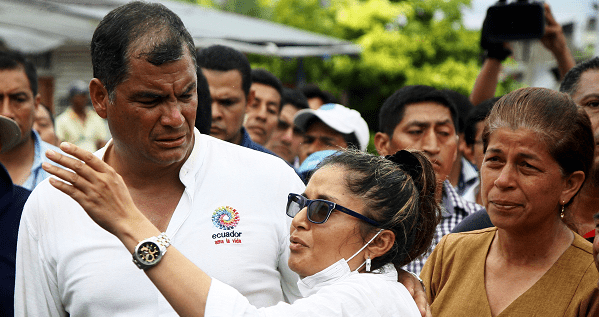Much of Ecuador’s Pacific coast was devastated by the 7.8 magnitude earthquake that struck close to the densely populated cities of Manta and Portoviejo on the evening of April 16 . Despite the country being in a period of mourning and shock, numerous news outlets and lawmakers have seized the opportunity to take shots at Ecuadorean President Rafael Correa.

RELATED:
Ecuador: We Cried ... Noticed We Can't Deal With Tragedy Alone
In an article for the New York Times, journalist Martin Pallares wrote civil society, non-governmental organizations and institutions that manifest interests and will of citizens, were outstripping the need for government intervention in the tragedy, in a clear jab at Correa.
Pallares wrote that some people distrust Correa’s centralized government, where government organizations fund projects of national interest, and would be reluctant to hand over money as they doubt the cash would go to those in need.
However, on a contradictory note Pallares conceded that one of Correa’s staunch opponents, the mayor of Guayaquil and lawmaker for the center-right Social Christian Party, Jaime Nebot, had appealed for locals to donate to publicly held institutions to fund the rebuilding of cities and towns on the coast that Ecuador relies on for its tourism industry.
In another bizarre contradiction, Nebot too said giving the state money for the crisis will result in "less consumption, less ability to pay, fewer sales and collection, ie economic decline and stagnation,” in an interview earlier this week.

Volunteers offer food and water to people in Pedernales, after an earthquake struck off Ecuador's Pacific coast, April 21, 2016 | Reuters
Columnists, such as Pallares, also took the opportunity to deride Correa’s strategy to invest in education, health, renewable energy and poverty eradicating projects over keeping a savings account ready for the unlikely event of a natural disaster.
Related:
World Bank Offers Ecuador $150M Loan for Earthquake Relief
“Now, with the country on the brink of bankruptcy, people are asking why Ecuador doesn’t have a savings fund like the one Chile had built up,” Pallares wrote, “with revenues from its copper industry, a fund that helped to provide the more than $25 billion needed to cover the costs of reconstruction after a major earthquake in 2010.”
Correa’s decision to spend surpluses from Ecuador’s oil revenues on projects for the good of the Ecuadorean people has led to at least 1 million people being lifted out of poverty during his nine year tenure in office. While he has also overseen the doubling of the country’s minimum wage and massive investment in education, which has resulted in significantly more Indigenous people entering higher education and gaining degrees. Such positive changes would have been impossible without significant investment.

Indeed, his plans to increase taxes for those earning significantly more than the national average in the coming months to fund the coast’s recovery is consistent with his previous policies that have lifted up Ecuador’s poorest and most vulnerable.
"The pain of one, is the pain of everyone," Correa said last week, praising the collective effort made so far by individuals, state agencies, international organizations, and the private sector.
Minister of Economic Coordination Patricio Rivera clarified some of the measures announced last week in a press conference: "The solidarity contribution of 0.9 percent for fortunes over US$1 million will be applied once only, and will not apply to citizens directly affected by the earthquake on the coast." As for the progressive tax on salary, an Ecuadorean worker earning US$1,000 will contribute a one time amount of just US$33.
Correa Smeared
Palleres and the New York Times weren’t the only journalists and news organizations to go after Correa, who flew home from an oil and gas conference in Doha, Qatar, on Sunday upon hearing of the quake.
Colombia’s Nuestra Tele Noticias 24 Horas, commonly known as NTN24, which has a history of support for South America’s more conservative governments, broadcast a short clip on Friday of Correa engaged in an uncharacteristic confrontation with a fisherman in Pedernales, one of the worst affected towns.
Correa, who was clearly distressed, was filmed telling a man in a raised voice not to lose his patience.
It is telling that NTN chose a short excerpt of Correa losing his cool to broadcast on its network as opposed to showing one his many embraces with victims of the quake, for example.
Rafael Correa embraces a women in the city of Pedernales April, 22. 2016 | EFE
In its attempt to stoke pressure on the president, the television station also failed to mention Correa’s insistence in remaining in the worst affected coastal areas, inspecting the damage and talking to locals, when he could have easily returned to Quito to oversee the tragedy from government offices.
Correa said on Saturday that Ecuador should be proud of its quick response that saw 113 pulled from the rubble alive.
“Now we have to provide shelter for victims, rebuild and recover economy,” he said referring to the tax proposal presented Wednesday.
He also praised the solidarity displayed by the majority of Ecuadorians although admitted some groups have tried “to manipulate" the situation for personal gain.
The Recovery
Authorities have confirmed the deaths of 646 people thus far, most of whom were in seaside towns scattered across the rim of the Manabi province. However, the toll has been rising every day and with over 100 people still unaccounted for the death count will likely increase.
Furthermore, 8,000 were injured in the tremor and around 26,000 saw their homes and livelihoods destroyed in one cruel swoop of nature’s hand.
A total of 700 aftershocks have been felt in the days following the country’s worst earthquake in nearly seven decades, with a worrying 6.0 magnitude tremor striking northwest Ecuador on Thursday morning sparking fears of further destruction.
Correa has estimated damage at US$2 billion to US$3 billion, while towns like Jama and Canoa have seen over 90 percent of its infrastructure destroyed.
"Canoa, for example, lives mostly from tourism, and the damage will mean a drop of visitors, so residents will require immense help from the government," reported teleSUR's correspondent Lucho Granadas Cejas.
In Manabi, authorities estimate that 8,000 stores out of 18,000 have been flattened.
Although devastating, the earthquake has united much of the country and wider region. In almost every neighborhood, towns large and small, there are collection points for donations of clothing, food and blankets.
Quito airport, from where some of the essential supplies are shipped to the coast, has seen hundreds volunteer their help in loading planes and trucks with critical items.
The volume of people offering support has seen some places ask volunteers to stay home as they already have sufficient number of people helping out.
Despite being on the end of some unsavory criticism, the medical support Ecuador has received from the likes Venezuela, Chile, Colombia, Peru, Spain, France, and even Palestine is perhaps testament to good foreign relations the country has maintained under Correa’s stewardship.
RELATED:
Ecuador's Correa Tells US Media to Get the Story Straight
Venezuela alone has sent four humanitarian missions since the natural disaster. The missions consist of rescue workers, doctors, nurses and soldiers of the Bolivarian National Armed Force who have extensive experience in handling natural disasters.
Openly criticizing Ecuador's two time elected president in one of the country's worst crises could be described as poor taste, to say the least. Correa was elected on the basis he would reduce inequality and poverty, and put an end to an Ecuador run by a handful of self-serving elites. He has delivered much of his promises with policies that have improved the quality of life for millions across the country.
However, as Correa warned in January, the country's political opposition and their allies in the private media are set to unleash a “dirty campaign” against the government. According to Correa, their goal is to “wear out” the government and its supporters ahead of elections and try to win control of the country's National Assembly.
It appears the private media has used the tragedy of an earthquake, even with death and destruction left in its wake, to launch its “dirty campaign” early.